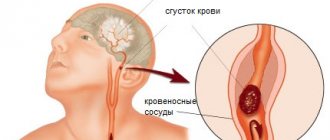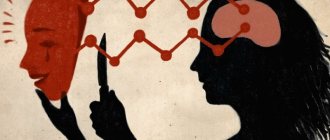Sociopathy (dissocial personality disorder) is a term that has recently appeared in psychiatry and denotes a persistent disturbance of a person’s character, which complicates his social adaptation, accompanied by a disregard for foundations and norms. Literally it can be translated as “socio” - society, “pathia” - disease. Literally, sociopathy is “a social disease, a violation of relationships with people.” Sociopaths are distinguished by aggressive behavior, bad character, and inability to build relationships with others. Today, the term “sociopathy” is fashionable thanks to various films and TV series about heroes who “go beyond” social rules. During the development of domestic psychiatry and psychology, scientists used another term: “psychopathy.” Within this disorder, their types are distinguished according to different classifications, but the following characteristics remain the same:
- persistence of manifestations of violation (they do not go away);
- totality (the violation affects the entire personality as a whole, and not individual mental functions);
- violation of social adaptation.
The line separating psychopathy and sociopathy is very arbitrary. And it lies in the origin of the disorder (etiology). Psychopathy is traditionally considered more of a congenital disorder, in which there are specific features in the structure of the brain and/or disruption of biochemical and metabolic processes that cause behavioral problems. Sociopathy has more social causes in origin - a destructive family, chronic psychotrauma, deprivation of affection and care in early childhood, a distorted type of upbringing, etc.
Etiology of sociopathy
There is no consensus among doctors and scientists about why sociopathy occurs. Experts name the following causes of the disorder:
- heredity;
- mistakes in education;
- problems in society;
- copying the behavior of a person suffering from this illness: imitation of an individual who is in a close environment - family or friends.
As a rule, the reasons act in combination, “layering” on each other, so it is extremely difficult to single out one factor.
Causes of psychopathy
The factors leading to the development of personality deviations are very diverse.
Important psychiatrists include:
- Heredity. The manifestation of psychopathic problems in the family is a prerequisite for their occurrence in close relatives.
- Pathology of pregnancy, complicated childbirth and painful childhood.
- Unfavorable environment of upbringing and life with the experience of psychophysical violence, tyranny, inappropriate behavior of persons (in places of deprivation of liberty), on whom the psychopath was dependent.
- Transference of psychologically traumatic situations: deaths, disasters, accidents, wars and other factors that have a destructive impact on the psyche.
Types of Sociopaths
Individuals with dissocial disorder are divided into two types:
- Passive.
- Active.
The first type includes calm and silent people, characterized by good behavior due to fear of being punished. Such individuals are aware of the consequences of their actions and restrain themselves. A provoked individual of the passive type behaves very violently. This type adapts more easily to society, and psychotherapy in this case is more effective. The active type cannot restrain himself. Such people want to attract everyone's attention and are characterized by conflict, fights and aggression.
Forms of sociopathy (dissocial disorder)
The following forms of this pathology can be distinguished:
- Active sociopathy
- Passive sociopathy
This division is based on the degree of compensation for psychopathic personality traits and the ability to exist in society.
Passive form of sociopathy
The passive form of sociopathy is considered as a compensated option in which a person recognizes the power of authorities, laws, religious rules or traditions. Thanks to this, the adoption, to some extent, of social rules of behavior makes it possible for sociopaths to live in society relatively without conflict. But at the same time, they are callous and indifferent to the desires and needs of other people, whom they completely ignore and do not consider important in their lives. This also applies to family.
Thus, sociopaths are not able to attach themselves to people and do not have empathy. They do everything solely of their own free will, but with an eye on the authorities and laws to which they formally obey. In passive sociopathy, manipulation and deception are often observed without significant violation of the laws and rules of society.
Active form of sociopathy
The active form of sociopathy is an extreme degree of expression of personality traits, due to which these people cannot adapt to society. Correcting their behavior is extremely difficult and often almost impossible.
Basically, the active form of sociopathy leads to the fact that a person breaks the law and cannot build his life path without criminal episodes. Such a person can sometimes adhere to regulations and rules, but only for a short time and for the purpose of some personal gain, but most often there is complete social maladaptation.
Manifestation of sociopathy
From the moment of manifestation, sociopathy usually persists throughout the rest of life. A distinctive feature of sociopaths is considered to be destructive behavior towards the environment and towards oneself. Such people often suffer from alcoholism, drug addiction, and lead a promiscuous sex life. Individuals with dissocial disorder are unable to plan long-term. Restriction of freedom and suppression of desires are tolerated negatively by them. They may threaten others and use force. Sociopaths are excellent at manipulating other people. Since they do not understand interpersonal relationships and are not afraid to offend or hurt another person, they view others as means to obtain the desired result. Individuals with dissocial disorder always try to dominate others. What others want and feel is of no concern to them. At the beginning of communication, sociopaths leave a good impression. They can behave well and observe standards of decency as long as they feel their own benefit.
Diagnostics
Diagnosis of dissociative disorder includes a detailed medical history, history of the development of the disease, physical, neurological and psychiatric examinations, assessment of the clinical picture; studying the characteristics of the psychosocial environment, living conditions, the patient’s environment, stress factors, and the ability to cope with life’s stressful situations. This excludes physiological or neurological disorders that could lead to similar symptoms.
Differential diagnoses include separation anxiety disorder, generalized anxiety disorder, panic disorder, school phobia (in children), depression, and sometimes impending psychosis.
False-positive diagnoses (less than 5% of cases) are more often made in women, children with mental disorders, patients with unusual movement disorders or epilepsy.
Signs of sociopathy
If the disease is hereditary, then the first signs of sociopathy appear in the child in the preschool period. The symptoms of sociopathy (dissocial disorder) are expressed vividly. This is explained by the fact that a preschooler cannot understand his benefit by observing the norms and rules of good behavior. Such children lack the experience to control their impulsiveness. Therefore, their antisocial behavior is often accompanied by negative actions characterized by cruelty. They torture animals, can even kill them, and bully peers and younger children. Children's disobedience manifests itself in such actions as screaming, biting, fits of anger, running away from home, and wandering. A preschooler never demonstrates tenderness towards his family. The older the child gets, the more he learns to disguise himself, his behavioral manners become tougher, his actions become more sophisticated. If parents react incorrectly, this behavior can become even more entrenched and worsen. It is very important to develop an adequate parenting style, since childhood is the period when the child is most sensitive to social norms; he copies behavior subconsciously. This is intended by human nature. It is possible and necessary to influence the development of sociopathy and mitigate its manifestations in childhood. By adolescence, the symptoms of a personality disorder begin to “bloom”: a teenager may begin to leave home, steal, severely beat other people, demonstrate pseudo-suicide attempts in order to receive benefits from relatives. There is a very high probability of various chemical and non-chemical dependencies, etc.
Causes of Sociopathic Disorder
There is still no consensus on the origin of this deviation. According to the biogenetic theory, we are talking about a hereditary predisposition to this disease. Statistics show this: if a family has close relatives with a sociopathic disorder in the male line, then the likelihood of having a boy with such a disorder increases five times compared to the population average. Often in the family of a patient with sociopathy there are relatives with hysterical disorder.
Proponents of psychological theory believe that the environment plays a large role in the formation of deviations. The disorder appears when the child is raised incorrectly, when the child is left without attention, or is subjected to excessive care, if he lacks love from the adults who are significant to him. Sociopathic disorder in children is observed if family members are involved in crime or suffer from chemical dependencies (alcoholism and drug addiction). Unfavorable living conditions and poverty increase the likelihood of illness.
Most psychiatrists and psychotherapists believe that the appearance of a sociopathic disorder is influenced by several factors, both internal and external. The presence of concomitant mental illness, pathological processes with damage to the central nervous system and traumatic brain injury are also important. Often the patient exhibits neurological abnormalities and changes in the EEG.
Diagnosis of sociopathy
Only after a thorough history can a person be diagnosed with dissocial disorder. The specialist records a stable lack of unity in most activities, emotional instability, attacks of aggression and poor control of actions. Symptoms of sociopathy include:
- lack of assessment of one's behavioral manners;
- disrespectful attitude towards people;
- refusal to accept generally accepted norms and laws.
This illness differs from the following mental illnesses:
- bipolar affective disorder;
- schizophrenia;
- neurosis;
- various manias.
Sociopathy in men
In representatives of the stronger sex, sociopathic disorder manifests itself in the form of physical violence against the weaker. From childhood, boys with this pathology begin to lie, steal and commit other acts condemned by society and the law; they behave inappropriately and aggressively. They derive a kind of pleasure from inflicting pain and suffering through deliberate actions.
Betrayal and infidelity can be considered signs of a sociopathic disorder in a man, and the patient always shifts the blame for these offenses to his partner. It is also typical for him to seek new sensations, constantly taking risks and using other people for this purpose. When resisting, he quickly becomes irritable, aggressive, or throws a tantrum or threatens. Sociopaths constantly lie because they consider others stupider than themselves; without a twinge of conscience, they exploit others, because they are sure that they have every right to do so.
Examination criteria
Sociopathy can be assumed if the following manifestations are present:
- predisposition to hostility that develops into violence;
- lack of feelings of guilt and the ability to draw conclusions from one’s own negative experiences;
- indifference to the feelings of loved ones, lack of empathy;
- ignoring moral principles, social rules and norms of behavior;
- strong denial;
- avoidance of any relationships and helplessness in maintaining them;
- accusing people around you for no reason, making unfounded claims;
- The individual welcomes conflict situations, so he often creates them himself.
All of the above symptoms are not always clearly expressed, sometimes they have a partial manifestation.
Additional symptoms of sociopathy that are of great importance when making a diagnosis:
- Predisposition to deception. An antisocial personality easily lies, manipulates people, and enjoys his actions.
- Frequent arrests of individuals by law enforcement agencies or public charges resulting from disobedience to the country's laws and authorities, as well as moral and ethical standards.
- Fights, protests, manifestations of irritability and aggression towards other people.
- Committing unjustified and risky actions.
- Involuntary antics in behavior and communication.
- Constant irresponsible attitude towards compliance with the regime and external requirements, financial obligations (for example, work from 09:00 to 17:00).
- Receiving joy from the discomfort caused and damage caused to others.
Treatment for dissociative identity disorder
Timely treatment can reduce the negative impact of the disorder, protect the patient’s life to a certain extent, and promote social adaptation.
Antidepressants are used to relieve severe symptoms of depression and anxiety in dissociative disorder. Also, as the main method of treatment, psychotherapy and its fundamental methods are widely used - such as the cognitive-behavioral method, hypnosis, the practice of family therapy, the insight method (defining conflict and overcoming traumatic syndrome). Any chosen method of psychotherapy works to determine the cause-and-effect relationship between the defense mechanism and the need to recreate multiple identities, and the main goal of treating dissociative identity disorder is to combine multiple identities into one holistic personality and its subsequent integration in life.
Prevention
Since the etiology of dissocial personality disorder has not been fully studied, there are no preventive measures for this disorder. It can only be noted that sociopaths need a favorable environment. The child should feel the attention, care, affection, kindness and tender attitude of his parents. It is important that the child’s mother and father set a positive example of relationships - respect for all family members, no power or aggression. The child must understand what role people play in relationships.
Correction (treatment) of sociopathy
As mentioned above, the greatest effectiveness of correction of sociopathy is achieved in childhood. Parents are not recommended to aggressively combat sociopathic manifestations in preschoolers; it is better to immediately contact a psychotherapist or clinical psychologist to develop the most appropriate parenting strategy. Dissocial personality disorder is difficult to treat. The reason for this is the lack of ability to criticize their behavior and the reluctance of sociopaths themselves to turn to a specialist. It is difficult for a psychotherapist to establish a connection with a sociopath, which is important for proper therapy, since the client himself does not want to change anything. If the form of deviation has mildly expressed symptoms of an aggressive nature, those suffering from sociopathy can consult a specialist themselves. Usually they complain about the difference with other people, a different type of thinking, a feeling of lack of important moments in life, etc. This is an excellent therapeutic request that medical psychologists and psychotherapists at the Ember Center successfully work with, provided that the client himself is aware of the need to receive help. The Ember Center successfully works with the correction of dissocial personality disorder. Our psychotherapeutic course is aimed at strengthening family ties, observing traditions, and developing respect for laws, norms of behavior and rules.
Social phobia
According to the simplified version of the Diagnostic and Statistical Manual of Mental Disorders, this is the name for the irrational fear of being in society, of excessive attention from strangers, of communicating with them, and of performing any public actions.
A social phobe is frightened by noisy parties, he is afraid to go to the blackboard at school or college, to give a report at work, that is, to speak in public. Such a person feels awkward if strangers look at him, when making acquaintances, the need to ask something from a person on the street, etc. Finding himself in any of these situations, he experiences stress, discomfort, and has an irresistible desire to run away and hide . This condition resembles a panic attack.
There are four categories of symptoms of social phobia:
1. Somatic (physical) manifestations:
- tachycardia, increased heart rate;
- headache;
- increased sweating;
- pain in the abdomen and chest;
- muscle weakness;
- tremor;
- nausea;
- shiver;
- increased blood pressure.
The body, receiving a signal from the brain about danger, is thus tuned to fight it: immune and digestive functions are suppressed, and increased blood flow to the main organs and muscles makes them work more actively.
2. Emotional:
- anxiety;
- irritability;
- feeling of anticipation of physical manifestations;
- the impression that this has already happened (déjà vu);
- voltage;
- “emptiness” in the head;
- strong fear.
3. Cognitive symptoms: a person thinks that he will die from the totality of his sensations.
4. Behavioral:
- insomnia;
- change in nervous habits;
- increased physical activity;
- constant concern;
- vulnerability;
- fatigue;
- impaired concentration;
- touchiness;
- the need to visit the toilet frequently.
Living with social anxiety
A person suffering from social anxiety in certain situations feels very bad both physically and mentally. Matthew Lieberman, a scientist from Harvard, found that both pain can be tolerated very poorly, and differ little from each other, since similar processes occur in the body.
As a rule, a social phobe, as they say, “works himself up” when someone else looks at him. The patient believes that special attention is paid to him, they discuss him, ridicule him, and think badly of him.
Experts say that this person is driven by the fear of being rejected by society. The roots of such a phobia are in the distant past: our ancestors were very afraid that they would be kicked out of the tribe, as this meant inevitable death.
It is very difficult for such people. They cannot succeed in school and work, they face difficulties in career growth, it is not easy for them to make friends and family, travel, etc. Their behavioral feature is the desire to abstract themselves from society in order to feel comfortable.
Even with all the predispositions (talent, connections, physical and mental capabilities) to be successful and happy, a social phobe cannot do this. If, while studying at school, he was under the control of his parents, who forced him to do his homework and attend an educational institution, then such patronage will not be provided at the university. As a result, the student is not able to participate in joint projects and present them, express himself, or spend time with peers, as young people do. As a result, the institute is abandoned “halfway”, the young man is left without a diploma and profession.
At work, everything happens the same way. The patient specifically finds a place where he is alone or very modest with a small group, to which he takes a long time to adapt. He doesn’t want to change this job for any other, because again he will have to look for a new one and get used to the employees.
People who experience unreasonable fear may know a lot, speak beautifully, and have many talents. They really want to be in public, to communicate, but when this happens, awkwardness, indecision sets in, and all knowledge disappears somewhere. Anxiety stops desire, since its manifestations are extremely unpleasant.
Those suffering from social phobia are usually aware that their fear has no basis, but they cannot do anything. The answer is simple: like any disease, social phobia needs to be treated so as not to miss the opportunities life gives.
It should not be confused with agoraphobia and introversion. Agoraphobes are afraid of the crowd as such, of being in the midst of it, and not of interacting with it.
As for introversion, it is not a disorder. Introverts simply, by nature, prefer to be alone with themselves. They are excellent conversationalists, but they prefer to think, fantasize alone and, as Carl Gustav Jung said, this is how they accumulate energy. Of the real-life famous introverts, we can name the scientist Albert Einstein, and if we remember the cinematic heroes, then these are Jon Snow (Game of Thrones) and Walter Hartwell White (Breaking Bad).
Who can be cited as an example of a social phobia? Member of the adorably terrifying Addams Family, Fester Adams is a classic example of this disorder.
What to do if a sociopath doesn’t want to change anything, but his family suffers?
A typical situation today: the mother of a young man calls and asks him to “cure him.”
During the conversation, it turns out that several specialists and different methods have already been “tested”, and all in vain. As a rule, the leading symptom is alcoholism or drug addiction. In such situations, we recommend that the mother herself come to an appointment first and start working on herself, her experiences, her reactions. After all, the behavior of a sociopath that he shows is inextricably linked with the reactions of family members (so-called codependency). Both mother and other relatives in this case are codependent. They are subconsciously manipulated by a sociopath, participate in his “performance”, pathological life system, scenario (they can be called differently, the meaning will not change). Therefore, by changing the attitude and behavior of relatives and mothers, we will influence the behavior of the sociopath, and perhaps motivate him to seek face-to-face correction from a specialist. You can also contact us through popular messengers:
Treatment of sociopathic disorder in Moscow
Treating sociopathic disorder is difficult. The problem is that people with this diagnosis do not consider themselves sick, and therefore do not seek help on their own. In addition, their illness is not accompanied by negative feelings; those around them suffer more from it. Psychotherapy for sociopathy does not help well, since even if a person feels some kind of inconsistency in himself in comparison with other people, it is not possible to establish a trusting relationship between him and the psychologist. And this condition is extremely necessary for successful work.
People with sociopathic disorder are most often referred to therapy by teachers, employers, or the law. At the same time, the effectiveness of compulsory treatment is extremely low due to lack of motivation. When attempting to contact such a patient, the specialist receives strong resistance.
Visiting self-help groups has a good effect; they bring together people with similar problems, and in this case the person receives understanding and support without judgment. A friendly atmosphere relaxes him and allows him to make contact. It is important that such a group has an experienced organizer who cannot succumb to attempts at manipulation, and the absence of participants who can become followers and be influenced.
Often, with constant contact with a sociopath, relatives suffer; they are subjected to manipulation and cruel treatment, and at the same time they do not see repentance on the part of their loved one. Therefore, it is important for them to also undergo psychotherapy sessions. As a result, they will gain knowledge about what they can do to set boundaries and protect themselves from aggression and anger. The psychologist will advise how to overcome existing problems in the family.
Our clinic has psychotherapists with successful experience in providing assistance for various disorders, including sociopathic disorder. We help a person regain trust and normal relationships with people, colleagues, and close relatives.
For severe impulsivity and concomitant somatic pathologies, anxiety and depression, medications are used. Due to the tendency of patients with sociopathic disorder to form addictions, potent drugs are prescribed for a short period and in minimal doses. Severe aggressiveness can be controlled with lithium drugs. The choice of medications is made by a psychiatrist or psychotherapist.








